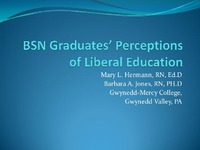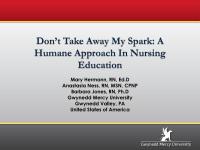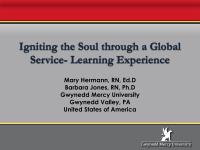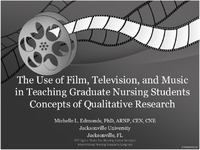BSN graduates' perceptions of liberal education
View File(s)
- Author(s)
- Details
-
Mary Hermann, RN, MSN, EdD; Barbara Jones, PhD, RN
Visitor Statistics
Visits vs Downloads
Visitors - World Map
Top Visiting Countries
| Country | Visits |
|---|
Top Visiting Cities
| City | Visits |
|---|
Visits (last 6 months)
Downloads (last 6 months)
Popular Works for Hermann, Mary by View
| Title | Page Views |
|---|
Popular Works for Hermann, Mary by Download
| Title | Downloads |
|---|
View Citations
Citations
The purpose of the presentation is to inform the audience of the findings of this qualitative research study that explored the lived -experience of recent (BSN) graduates in a curriculum grounded in a liberal education. Recommendations for strengthening liberal and professional nursing learning connections impacting leadership capacity will be discussed. The phenomenological psychological philosophy of Paul Colaizzi (1978) provided the theoretical foundation for this study and guidance in the research methods. Dialogal interviews were utilized to collect qualitative data for the study. The interviews of twelve recent BSN graduates enrolled in a (ASN to BSN) program were audiotaped face to face, transcribed and interpreted for meaning. The three themes that emerged were "unclear of the meaning of liberal education", "usefulness of liberal education", and "descriptions of learning"�. Findings from the study revealed that even though participants were unclear of the meaning of liberal education, they accepted that this was an important part of the curriculum that they "needed to get through"�.�Overall, participants explained that the learning from discrete liberal education courses was valued but did not comment that their nursing faculty connected this liberal learning with professional nursing. Furthermore, for the most part, the usefulness of the liberal education courses was perceived "after the fact"� and generally valued for their perceived relevance to nursing. In conclusion, some recent graduate nurses were able to articulate the values of liberal education to professional nursing education after they understood the meaning of the term. The study contributes to the nursing and higher education pedagogical literature and suggests curricular recommendations for strengthening liberal and professional learning connections and student leadership development.
41st Biennial Convention - 29 October-2 November 2011. Theme: People and Knowledge: Connecting for Global Health. Held at the Gaylord Texan Resort & Convention Center.
Items submitted to a conference/event were evaluated/peer-reviewed at the time of abstract submission to the event. No other peer-review was provided prior to submission to the Henderson Repository, unless otherwise noted.
| Type | Presentation |
| Acquisition | Proxy-submission |
| Review Type | Abstract Review Only: Reviewed by Event Host |
| Format | Text-based Document |
| Evidence Level | N/A |
| Research Approach | N/A |
| Keywords | Leadership Capacity; Liberal Education; Professional Nursing Education |
| Name | 41st Biennial Convention: People and Knowledge: Connecting for Global Health |
| Host | Sigma Theta Tau International |
| Location | Grapevine, Texas, USA |
| Date | 2011 |
All rights reserved by the author(s) and/or publisher(s) listed in this item record unless relinquished in whole or part by a rights notation or a Creative Commons License present in this item record.
All permission requests should be directed accordingly and not to the Sigma Repository.
All submitting authors or publishers have affirmed that when using material in their work where they do not own copyright, they have obtained permission of the copyright holder prior to submission and the rights holder has been acknowledged as necessary.
Related items
Showing items related by title, author, creator and subjects.
-
Don't take away my spark : A humane approach in nursing education
Hermann, Mary; Jones, Barbara; Ness, Anastasia (2016-07-13)Session presented on Monday, July 25, 2016: Purpose: Given the intense demands of the 21st century, how can nursing educators construct a nursing curriculum that seeks to prepare competent, humanistic and globally educated ... -
Igniting the soul through a global service-learning experience
Hermann, Mary; Jones, Barbara (2016-03-17)Session presented on Sunday, July 26, 2015: Purpose: How can the pedagogy of engagement in the human condition ignite the soul of a nursing student and foster exploration of issues such as culture, gender, sociopolitical ... -
Nursing education: Building gerontological capacity and capability by improving perceptions of older adults by nursing students
Heise, Barbara A.; Johnsen, Vickie (2012-9-12)An aging crisis exists globally. Despite the influx of the older adult population, there exists a lack of trained gerontological healthcare professionals (Lun, 2011). Ageism is commonplace. Nursing students frequently see ... -
Interprofessional nursing education for technological advancement in cardiac arrest documentation
Gray, Margaret; Christov, Stefan C.; Glynn, Barbara C.; Hermann, EileenTo better prepare nursing students to use technology and interact with professionals from technological fields, collaboration between a nursing course and a software engineering course enhanced learning through the trial ... -
Perceptions of graduates from online accelerated pre-licensure second-degree bachelor of science in nursing programs on quality of educational experience and readiness for clinical practice
Jones, Virginia L.There is an increasing use of distance learning methods being utilized for nursing education. Accelerated second-degree Bachelor of Science in nursing (ASDBSN) programs have increased rapidly from 31 in 1990 to 230 in 2013 ...





